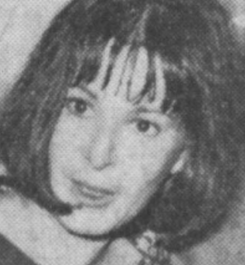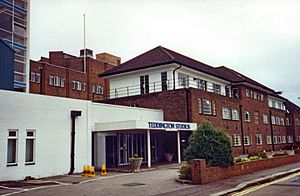Verity Lambert facts for kids
Quick facts for kids
Verity Lambert
|
|
|---|---|

Verity Lambert, from a 1965 newspaper
|
|
| Born |
Verity Ann Lambert
27 November 1935 London, England
|
| Died | 22 November 2007 (aged 71) London, England
|
| Education | Roedean School |
| Alma mater | University of Paris |
| Occupation | Television and film producer |
| Known for | First producer of Doctor Who |
| Spouse(s) |
Colin Bucksey
(m. 1973; div. 1987) |
Verity Ann Lambert (27 November 1935 – 22 November 2007) was a famous English television and film producer. She started working in TV in the 1950s. She became the first producer of the popular science-fiction series Doctor Who from 1963 to 1965.
Verity Lambert was one of the most powerful people in the British entertainment industry. She was a symbol of how women could succeed in media. She was known for making great TV shows from simple scripts and good actors.
Contents
Verity Lambert's Early Career
Verity Lambert was born in London, England. She went to Roedean School and then studied languages at the University of Paris. After returning to London, she went to a secretarial college. She learned a lot about writing scripts from her English teacher.
Her first job was typing menus at a hotel. In 1956, she started working in TV as a secretary at Granada Television. After six months, she moved to ABC Weekend TV.
Working at ABC Weekend TV
At ABC Weekend TV, Verity Lambert became a secretary for the Head of Drama. Soon, she was a production secretary for shows like State Your Case. She then moved into production, working on drama shows like Armchair Theatre and early episodes of The Avengers. These shows were overseen by Sydney Newman, who would later be very important in her career.
Live TV shows in those days could be tricky. In 1958, an actor died during a live broadcast of Underground. Verity had to quickly take over directing the cameras. This showed how capable she was under pressure.
In 1961, Verity left ABC to work in New York for a year. She came back to England hoping to become a director. But she stayed a production assistant. She decided if she didn't get promoted soon, she would leave TV.
Producing Doctor Who
In 1962, Sydney Newman became the Head of Drama at BBC Television. The next year, he asked Verity Lambert to join him. He wanted her to produce a new show he had created called Doctor Who. It was meant to be an educational science-fiction series for Saturday evenings. The show was about an old man who traveled through space and time in a police box called the TARDIS. Many people thought the show would only last for 13 weeks.
Doctor Who first aired on 23 November 1963. It quickly became a huge hit for the BBC. A big reason for its success was the alien creatures called Daleks. Verity's boss, Donald Wilson, had told her not to use the Daleks. But after their first episode was a success, he admitted she knew the show best.
The success of Doctor Who and the Daleks made Verity famous. In 1964, a newspaper wrote about her. It said she was "remarkably attractive" and the youngest, and only, female drama producer at the BBC.
Verity Lambert produced the first two seasons of Doctor Who and part of the third. She left the show in 1965. She felt the show needed new ideas after 18 very busy months. She had produced about 70 episodes.
Other BBC Shows and Beyond
After Doctor Who, Verity produced another BBC show called Adam Adamant Lives! (1966–67). She also produced a new soap opera called The Newcomers. Later, she worked on the crime drama Detective (1968–69) and adaptations of stories by William Somerset Maugham.
In 1969, Verity left the BBC to work for London Weekend Television. There, she produced shows like Budgie (1970–72). She also returned to the BBC as a freelance producer for Shoulder to Shoulder (1974). This series was about the suffragette movement, which fought for women's right to vote.
Leading Drama at Thames Television
In 1974, Verity Lambert became the Head of Drama at Thames Television. She oversaw many popular shows for the ITV network. These included The ... Civil Servant (1975), Rock Follies (1976–77), and Minder (1979–94).

In 1976, she also became responsible for Euston Films. This was Thames' film production company. She later became the chief executive of Euston Films in 1979. She oversaw shows like Quatermass (1979) and Widows (1983).
Verity had a very successful time at Thames and Euston. Many of the shows she oversaw won awards. The ... Civil Servant won a British Academy Television Award (BAFTA). Rock Follies also won a BAFTA. Widows had over 12 million viewers. Minder became one of Euston Films' longest-running shows.
Verity wanted Thames to make dramas that dealt with "modern problems and life." This was similar to the ideas of her mentor, Sydney Newman.
Moving to Film and Starting Her Own Company
Verity Lambert continued working with Thames and Euston Films into the 1980s. In 1982, she became the director of drama for Thames Television. She also joined the company's board of directors.
In 1983, she left Euston to work in the film industry. She became the director of production for Thorn EMI Screen Entertainment. The British film industry was changing a lot then, which made her job difficult. But she did produce some movies she was proud of, like Clockwise (1986) with John Cleese.
Cinema Verity Productions
In late 1985, Verity Lambert started her own company called Cinema Verity. Her first movie was A Cry in the Dark (1988). It starred Meryl Streep and was based on a famous case in Australia.
Cinema Verity also made successful TV shows. These included the BBC1 sitcom May to December (1989–1994) and So Haunt Me (1992–1994).
Verity was also an executive producer for the drama series G.B.H. (1991). This show won several awards.
One less successful show from Cinema Verity was the soap opera Eldorado. It was a co-production with the BBC and was set in Spain. It was very expensive to make. The show got bad reviews and only lasted a year, from 1992 to 1993.
In the early 1990s, Verity tried to get the rights to produce Doctor Who independently. But the BBC was already working with another producer.
Other Cinema Verity projects included Sleepers (1991) and The Cazalets (2001). The latter was co-produced with actress Joanna Lumley.
Verity also worked as a freelance producer. She produced the popular BBC One comedy-drama series Jonathan Creek from 1998 to 2004. She also worked on another comedy-drama called Love Soup, which aired in 2005. Her last work was producing the second series of Love Soup.
In 2002, Verity Lambert was honored with an Officer of the Order of the British Empire (OBE) for her work in film and TV. The same year, she received a special BAFTA award for her amazing contributions to television.
Verity Lambert's Legacy
Verity Lambert died of cancer on 22 November 2007, in London. This was one day before the 44th anniversary of Doctor Who.
Her work left a lasting impact. In 2000, her shows Doctor Who and The ... Civil Servant were ranked among the top British TV shows of the 20th century.
Doctor Who has paid tribute to Verity Lambert several times. In the 2007 episode "Human Nature", the Tenth Doctor mentions his parents as "Sydney" and "Verity." This was a tribute to both Sydney Newman and Verity Lambert. A dedication to her was also shown in the 2007 Christmas special "Voyage of the Damned".
In 2008, BBC Four had a special evening honoring Verity's work. It included a documentary and repeats of her popular shows.
For Doctor Who's 50th anniversary in 2013, the BBC made a drama about the show's creation called An Adventure in Space and Time. Actress Jessica Raine played Verity Lambert in the film.
In 2014, a special blue plaque was put up at Riverside Studios in London to remember Verity Lambert. It was unveiled by her friend and colleague, director Waris Hussein. The plaque was reinstalled in 2022 at a ceremony attended by many TV stars and producers.
Images for kids
-
ABC Weekend TV's studios in Didsbury, Manchester, where Verity Lambert worked in the late 1950s.
See also
 In Spanish: Verity Lambert para niños
In Spanish: Verity Lambert para niños
 | Valerie Thomas |
 | Frederick McKinley Jones |
 | George Edward Alcorn Jr. |
 | Thomas Mensah |


